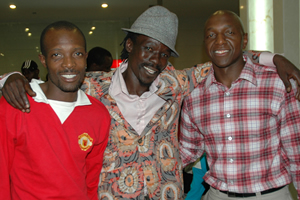Online editions abusing privileges
to the media was whether or not online publications required direct and official regulation by the Government.
Not surprisingly, staffers and publishers at Internet-based newspapers rejected the notion of a “Big Brother” watching over them.
But content on some of the online papers made available on their sites, particularly political cartoons, strengthened the argument that some form of regulation, self or otherwise, would be needed to ensure that the information they published adhered to basic journalistic standards.
One unsigned political cartoon published by the zimonline.co.za newspaper on 17 April, 2008, about two weeks after the polling date in the country’s harmonised elections, shows President Mugabe receiving a briefing from a member of the army.
The soldier is seen saying to the President, “Comrade President, we’ve finished stuffing the ballot boxes in readiness for the recount”. The President is depicted replying, “Good, make sure the rigging is resounding this time!”
The soldier’s mission, as made apparent by the text in the speech bubbles, was to “rig” the elections by secretly filling ballot boxes with votes to help swing the presidential elections in Mugabe’s favour.
The political cartoon reflects concerns raised by the opposition figures and their supporters.
On 13 April, 2008, the then MDC spokesperson, Nelson Chamisa, said, “We will not accept any recount, because for us that is accepting rigged results. ZEC has been in custody of the ballot boxes for two weeks, and heaven knows what they have done with the ballot papers. They might have stuffed with their votes.”
The word “might” in the last part of Chamisa’s statement shows that the assertions were only fears, and were not facts based on available supporting evidence.
This political cartoon is therefore more speculative than it is a reflection of actual political developments in Zimbabwe.
The text and language used in the composition gives the impression that Mugabe uses the army to tip elections in his favour.
The speech bubble attributed to the soldier claims electoral fraud that was calculated and deliberate task sanctioned by the Zimbabwean leader, who responded with words suggesting satisfaction with the progress made.
The last two words attributed to President Mugabe, “this time”, allege that the Zimbabwean leader is a “serial rigger” of elections who is not engaging in the act of election rigging with this soldier for the first time, assertions that are not supported by any evidence before, during or after the 2008 polls.
Though none of that can be taken as fact, the cartoonist proceeded to present a stereotypical representation of the President as dishonest, corrupt and cunning.
The Zimbabwean army is reflected as a corrupt, convenient partner to President Mugabe that is rewarded with considerable wealth for all the dirty work it does.
The composition uses the lone soldier as a metaphorical representation of the Zimbabwean army, falsely implying that President Mugabe owes his continued stay in power to the uniformed forces.
Another shocking political cartoon was published by the zimonline.co.za newspaper on 14 April 2008, two weeks after the polling date in the Zimbabwe harmonised elections.
It shows President Mugabe, clad in a school uniform, dipping his hand into a cookie jar and grabbing a cookie labelled “Presidential Elections”.
The political cartoon effectively suggests that the Zimbabwean President orchestrated a deliberate plan to illegally and unconstitutionally retain political power that he had lost through the election process.
The cartoon, by suggesting that the delay automatically translated into electoral fraud, without any supporting evidence being available in the mainstream media or any public forum, challenges the notion of free speech.
The cartoon does not comment on current affairs, neither does it creatively “invent” a scene to place a comment in context.
Rather, it suggests an event that is at odds with reality. The results that were released two weeks after the publication of this political cartoon confirm this.
When the official results were finally announced on 2 May 2008, Tsvangirai had obtained 47,9 percent of the votes, and President Mugabe had gained 43,2 percent, results that both candidates accepted while expressing willingness to participate in the June 27 run-off.
Metaphorical representations feature strongly in the political cartoon. The school uniform is used as a symbol to suggest mischief, naivety, and immaturity on the part of the Zimbabwe leader, while the ZEC is depicted as a cookie jar, and the elections are the cookies.
The metaphors feed into the stereotypical representations suggested by the political cartoon. He is shown wearing clothes associated with children and is also caught in the act of doing a childish deed, namely stealing a cookie from a cookie jar.
The political cartoons published by the online publication reveal a distinct abhorrence towards the Zimbabwean President, and the views presented in them are far from free speech expressions and a lot closer to senseless ridicule.








Comments